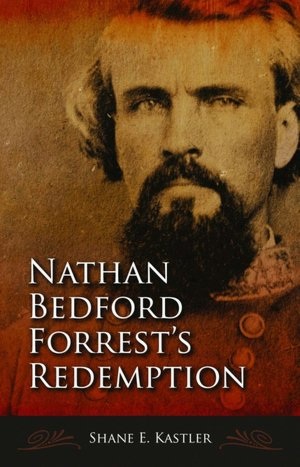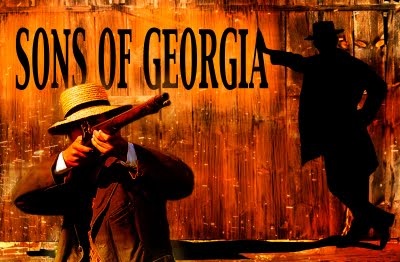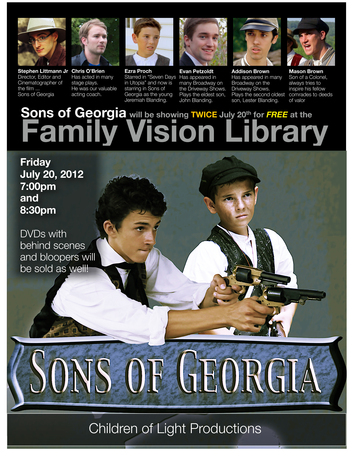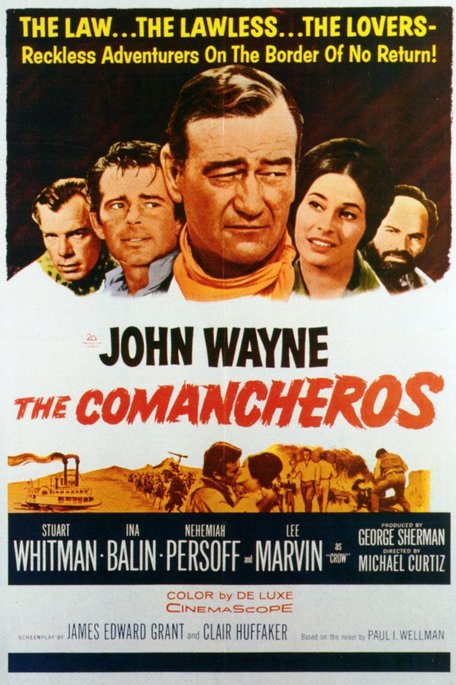It took me long enough to read this under 200 page book about Nathan Bedford Forrest. General Forrest has always been one of my heroes and so when I saw the title of this book, Nathan Bedford Forrest's Redemption, I snatched it up at the Suwanee Raid reenactment
without hardly even thinking about it. Upon getting it home and removing the plastic, I found that the author, Shane Kastler, is an ordained Southern Baptist as well as an SCV member.
This book is decidedly Christian. Not only does Mr. Kastler quote scripture, but he continually draws one's attention back to the goodness and graciousness of the Lord--in his blessing of Bedford finacially before the war, in preserving his life during the war, and drawing him to Himself as he got continually feebler and more ill. There was a mildness in his manner, a softness of expression, and a gentleness in his words that appeared to me strange and unnatural. At first I thought his bad health had brought about this change, but then I remembered that when sick or wounded he was the most restless and impatient man I ever saw. Soon I told him that there was something about him that I couldn't understand, that he didn't appear to me to be the same man I used to know so well. He was silent for a moment, then seemed to divine my trouble, and, halting suddenly, he took hold of the lapel of my coat and turned me squarely in front of him, and raising his right hand with that long index finger (his emphasizer) extended, he said, "Major, I am not the man you were with so long and knew so well. I hope I am a better man. I've joined the Church and am trying to live a Christian life...Mary has prayed for me night and day for many years, and I feel now that through her prayers my life has been spared, and to them am I indebted for passing safely through so many dangers."
~~Major Charles Anderson Mr. Kastler paints a vivid picture of the man. I understand Bedford Forrest better than ever now. He does not try to hide his faults (such as his filthy bad temper) nor does he attempt to make more of them than necessary (such as the Fort Pillow massacre). He attempts to show the reader both the sins and the virtues of the man.
What is so very intersting about General Forrest is that he knew from his youth the tenets of Christianity. He believed them, but did not necessarily apply them to himself. He encouraged them in others--going so far to make sure his son, who enlisted with in at the beginning of the War Between the States, had other godly young men to associate with.
Nathan Bedford Forrest's Redemption is not an extremely in-depth book. It is an easy read and if I hadn't been distracted by other things, I probably could have finished it in practically one-sitting. I enjoyed it very much and would highly recommend it. Looking at it from a purely objective standpoint (whatever a 'purely objective standpoint' is!), I would be inclined to say that a unbeliever might find it somewhat preachy as Mr. Kastler takes the time to use examples from scripture to prove whatever point he is after.
You could give this to your kids to read without worrying about the content (unless you are worried that they will start saying 'damn'--that is in at least one quote). The writing-style is simple and engaging. There is much about Forrest that we could emulate, but like with any man, there is much we can learn from his faults.
5-stars
Racheal
Opus Arte's production of William Shakespeare's romatic comedy; which just so happens to be my favorite Shakespeare play. As most of you know, As You Like it is the story of Rosalind and her cousin, banished from the Duke's court...and young Orlando, the lover. What is so totally cool about this production is that it was filmmed at the Shakespeare Globe Theatre! It is a recording of a live performace; and the production values are great. The actors are professionals for sure. It was great fun to watch how they interacted with the audience :) The costumes were very period and the wigs (there were a few) were so natural that the bald guy might as well as grown that head of hair and Rosalind cut hers. (In the way I imagine it, Rosalind--as Ganymede--simply kept her hair securely under a hat.) There were a few things that I wondered if they might not be period correct, but after talking to Savannah, would say that probably they were. You know, folks from the 16th century really weren't near as prudish as 21st century people--even though we expose more flesh. For those with young boys, there was two scenes where a female character is adjusting her chest to look more attractive--nothing too horrid, but still. For the easily grossed out, Touchstone (the jester) makes a somewhat crude gesture twice... The finale was funny because the entire casts dances a modern dance to period music before they bow off. They look like they are having a ball while doing so :) 5-star rating Racheal
Sons of Georgia is a film by Children of Light Productions that tells the story of one family during the War Between the States. The message, as spelled out by 'Lester' to his brother 'Sam' is very timely. Freedom is not free; sacrifice is necessary to preserve our principles. Told from the perspective of the youngest son as written to his grandson, it really is the story of the third son overcoming his fear and uncertainty. It is the coming of age story of Sam Blanding during the days of Sherman's "March to the Sea". The Worldview: This film was made by Reformed Christian young people. The worldview can be summed up by saying: God is sovereign. The Production Values: I will be quite honest, the production values are not industry standard, but I have seen worse in Independent Christain films. There were a few scenes where they used visual effects...for instance, one character get's his leg slashed with a saber. The editor created a 'blood spatter', which in my opinion was unrealistic looking. I wouldn't have noticed if he had not put it in there. (I would have shot that scene a tad different--it could have been more effective.) Overall the camera work was pretty good (better than anything I could so--particularly at the stage of the game I am at! ) The music is good. Some of it was composed by Gabriel Hudelson. I recognized it partly because I'd heard it before--but I think I would have anyway. Gabriel's music is rather distinctive. I r eally like it. Costumes: Some were better than others, but if you didn't know any better you wouldn't notice that this lad and that had on modern button up shirts. They could have taken better care with the ladies hair. Women always parted their hair down the middle--several girls have it parted on the side. (Just a minor quibble--but I thought I would mention it.) The Acting: Much better than 'Sybil Ludington'. There were a few times when the actors could have been more passionate. I think they would have been if they hadn't been concentrating on their Georgia accents...it is my opinion that if you can't hold an accent you are better off not attempting it at all. To me, it is much more distracting (and thereby detracting from the movie) to listen to bad/in and out accents then it is if the actors don't try. On a more positive note--the tears/crying were pretty convincing. Overall, the acting was great for an independent film. My personal opinion is that if young Samuel Saffa keeps acting, he could make a very fine actor. He's pretty good. I won my copy of Sons of Georgia in a giveaway hosted by A Window Into My World (thank-you, Allison!!) I was so very excited to get it and I wasn't disappointed with it, even with the one or two places where it drug just a bit. Overall the story was pretty good, the acting was good, the message was good. I highly recommend this film for two reasons: 1. It is wholesome material for families to view; 2. We have to support our young independent filmmakers. Even though their films may not be industry standard, how can we expect them to make more--and reach industry standards-- without our support? Rating: A 5 for worldview; a 4 for independent films. Keep it up guys! Racheal
Author: Paul I. Wellman
Setting: 1840's Texas
Plot: Paul Regret, New Orleans' gambler, engages in a duel with the only son of influential Judge Beaubein. Regret shoots the young man, but does not kill him. Regardless, he has to flee New Orleans with a price on his head. Going to Texas, he is given a choice by Sam Houston himself, of either being extradited to Louisiana or joining the Texas Rangers. Regret cho0ses to join the Rangers, not because he wants to be a Texas Ranger, but because he preferred that to hanging. He learns the ropes of being a Ranger...witnesses the aftermath of a Comanche raid [and from reading The Captured by Scott Zesch (I never finished it), I knew exactly what the author delicately alluded to]...and with his shooting skills earns respect, if not acceptance among the Rangers.
When Regret is commissioned with Tom Gatling (his rather hostile partner) and Captain Blake Henrion to discover the hideout of the Comancheros, the story really takes off. I won't let on what happens, only that they get captured.
Paul Regret's love interest is woven throughout the book and ends up being important to the story.
********************************************************************
There was a movie made from the book.... The Duke is not Paul Regret--rather he's the Tom Gatling character--with a different name. If you ask my opinion, the book is better. The Comancheros, the movie is actually quite different than the book. The opening scene is the same and then one scene when Regret is among the Comancheros is the same. That's about it.
In the movie, Paul Regret meets his love interest on a boat (in the book he's known her for several years). He is arrested on the boat by the Duke (or Jake Cutter). Sam Houston is not in the movie. Anyway, Regret gets hauled around by Cutter--Regret knocks Cutter on the head and runs away. He get's re-caught and ends up being drug into the Comanchero trip (no Capt. Henrion in this version). The end is not nearly as powerful.
That was very uncohearant...but I just wanted to say that the book was the better of the two stories. Of course, being a Duke fan--the Comancheros isn't bad :) (Duke is himself you know...I like the Paul Regret of the book better--he's not quite such a prig.)
Book: 5 star
Movie: 3 star Racheal
I have wanted to watch this movie for a while, since I re-discovered it in the DVD cabinet this winter. I'm going to say right off the bat, I enjoyed it. I believe I giggled more than I was on the edge of my seat. The Princess Bride has plenty of Drama, Romance (of course! it's a fairy tale), Danger, and Humor. It is somewhat hokey in someplaces, but for just having a good laugh...who cares!
The Plot: The little boy is sick: his grandpa comes and reads him the story of The Princess Bride. Naturally, the boy is rather resistant to a fairy tale to start with--but through the movie, he gets drawn into the story. (I found this a neat, even hiliarious twist.)
Buttercup is a commoner; Wesley is a commoner. They fall in love. (Suprise!) He goes off to seek his forture and "dies". Five years pass and Buttercup ends up being engaged to the Prince of the land. (She doesn't love him, of course--her heart still belongs to Wesley; even though she believes him dead.) The day of the engagement, she gets kidnapped. The kidnappers are followed by a man in black...between this point and the 'happily ever-after' there is danger, humor, suprises, trechary, and, well, romance. I don't want to give too much away, but things include poison, valient sword fights (my favorite!), fire swamps, etc. The identity of the villian is suprising and unexpected.
Pros and Cons on the story: Wesley is the hero...he is the faithful man who leads. loves, and protects. Buttercup is not a feminist. (I liked that part.) Niether character is portrayed as perfect. There is character growth (even if just tiny.) There is no magic. Even when Wesley is 'dead' and raised up he wasn't really dead--just mostly dead. (That whole part was funny as he 'comes back to life'--the actor was great!) I'm not quite sure if the filmmaker was mocking the church by making the bishop (or whatever he was) lisp something awful or not...I will say though that the lisp was unexpected and somewhat startling at first. (Rather sounds like Elmer Fudd--all 'r's are 'w's...) There was one word which was 'bad'--I don't know if it was 'Jeeze' or "Jesus" (okay, so the former is just slang for the latter and ought not be used at all either); it was only used once and by the little boy when he got agitated over what was going to happen next. That was the only profanity. There were NO CRASS JOKES. (Maybe that's because the film was made in 1987?) Buttercup's dresses were modest--no cleavage (you wouldn't get that today! They'd be taking every chance to show off her chest!) Certain characters were 'bad-guys' who end up being 'good-guys'--not exactly sure how to rate that, but the movie wouldn't have worked without them. There was enough kissing, but the focus was more on the story than the smooching. One thing I did notice that was somewhat odd--you never see Buttercup's parents; so I don't know if she was supposed to be an orphan or whether they would have just been extraneous characters that weren't really necessary...(i.e. character who would have been in one sence/had to been paid by the producers.)
The Art: The 'special effects' (F/X) work was very, very good for the time. I thought it looked more 'real' than some more modern, digital F/X or CGI work (take Star Wars [episodes 1-3] for instance--that looks fake.) The costumes were well done; except the crowns looked kind of hokey ;) The acting is professional...afterall, it takes a professional to act as limber as Wesley...(it makes me snicker to think of the sence I'm referencing.) The fencing was well done (as far as my limited knowledge could tell.) Some ot the make-up work was rather obvious, but as it's a fairy-tale it wasn't ridiculous.
Overall rating: For good, clean fun; 5-star. Racheal
This is the first Zane Gray book I have ever read, but I have seen several old Westerns based off of his books.
When I opened the cover, I was expecting something more of a rip-roaring adventure than what I found on the pages. (In retrospect, having seen the movies, I really shouldn't have.) It was really more of a romance. Not just even a love-triangle, more like a love-hexagon! Beware, there may be spoilers in the following...
The story revolves around the love Mr. John Curry holds for Mary Newton, a woman married to a scoundrel. Initally, John simply feels sorry for Mary as he realizes that she is a good woman and she is tied to a dirtbag in marriage (note: Mary did not know Wilber was a low life when she married him). The more John sees her, the more he comes to love her. He calls it a 'pure' love. I don't know exactly what to call it--seeing as it's a married woman and an unmarried fella, but I do know that it wasn't a lustful 'love'. John shows his true love for her, by his willingness to be non-exisitant in her world, so long as she is happy.
In time, Mary comes to also love John because he treats her with respect, honor, and dignity. She denies her feelings for John for a long time. She is faithful wife, even when Wilber treats her with disdain, distrust, and disloyalty. Wilber deserts her one day and steals everything of value from her in the process. Even then, the thought of divorce is far from her mind--indeed, it is unthinkable.
Surrounding these characters are the supporting cast of Katharine, Mary's old friend; High-Lo, a young cowboy that John rescued--these two are devoted to one another despite their ups and downs; and Magdeline, an Indian girl who plays a good sized part in the outcome of the story even though she is not a major charactor. Also there is Henley...but I won't go into him, else I might give too much away.
The Worldview: Well...I got the impression that Zane Gray believed in God--maybe even that God is soveriegn; but there was some of that early 20th century theology as well. I haven't been able to stick my finger on it exactly. Morality (based on the law of God) is good; immorality is wrong. In other words--adultery and murder are sin (two issues that could be temptations in the situation).
While you want John and Mary to be happy, there is never the sense of "Oh, just get together and everything will be alright" that seems to be prevalent in modern culture. No. To both of these characters doing the right thing, the honorable thing, is more important that what 'feels good'. I appreciated that a lot.
I'd rate this book a 4-star. That's for my uncertainty on the 'pure love' bit. I enjoyed it pretty well, but I rather doubt I this is a book I will read again. Also, I wouldn't give it to someone who can't discern between the good and the bad in the book. Something still kind of rubs me wrong about the whole situation, but the fact that it's one that you can actually see happening in real life. Racheal
Saving the Titanic is docu-drama by Tile Film Productions, a Irish production company. It tells the "untold story of the self sacrifice and dignity of the ship's engineers, stokers and firemen in the face of impending death".
From an artisitic viewpoint it was very well done. The CGI’s were awesome (in my opinion; I’m no expert, you know.) The shots of the 'Titanic' sailing along the ocean were particularly impressive.
The acting was quite good, but since they are Irish there were a few spots where I missed the dialogue :) However, no matter my American ear, the lines were delivered naturally and it was so realistic that I found myself (mentally at least) encouraging and praising the men at their work.
The information was presented clearly; the design of the ship--why she was supposed to be unsinkable and why she did sink. I found it fasinating that you got that from the actor protraying the designer himself.
There was just a tiny feeling of having missed something, but I think that is mainly due to the fact that I was watching the 52-minute TV version. They also made a 90-minute feature which probably would have filled in those gaps I thought I detected.
You also get a touch of the horror and fear that they must have felt, mucking around in the water stoking the engines and knowing that in all likelihood, they weren’t going to make it out.
The Worldview: I think I'd have to watch it again (which I would willingly!) to really be able to speak to this. However, it seemed to me to be fairly straight-forward history. I did not get any of that revisionist history stuff that made the rich men on board out to be cowards. But due to the nature of the movie, there wasn't really a place for that, even if the filmmakers hold that position (though honestly, I don't see how one could hold that view with a clear conscience when all the accounts point otherwise.)
Saving the Titanic…I’d defintely watch it again. 5-stars.
Racheal
Authoress: Agatha Christie
How does one write a review of a mystery without giving away, the whodunnit? I'll see if I can figure it out :P
First off, this is a Hercule Poirot story. Naturally that means plenty of the little Belgians comments. He is returning to London from the Middle East when the train he is traveling on founders in a snowdrift at the same time a murder is committed.
At first it appears that no one had a good motive for killing the deceased. After interviewing all the people on the Stambul-Calais coach (these passengers being the only ones in question) and then going through their belongings, Poirot puts his 'little gray cells' to work. Naturally, as he is Poirot, he leaves his fellow investigators in the dust (and of course the reader--unless your brain jumps to conculsions faster than mine). By the end of the story everyone is a suspect...in a deeper sense than initially. But there, lest I spoil it, I won't say anymore.
Suprisingly, I nearly guessed the ending of this one correctly. I was quite close actually (I NEVER do that!) The usual Agatha Christie descriptiveness was there. I would say that this wasn't one of the best ones that I have read, however. There are others that stick in the mind better...like The Murder of Rodger Ackroyd (one of the very first Christies I read), Passenger to Frankfurt (I really enjoyed that one; it was somewhat different that most), and And Then There Were None (I believe that is the American title).
Especially in Poirot books, Christie tends to let the murderer (or murderers, depending on the story) get away with the crime if it serves 'justice'. For instance, if the murdered person happens to be a bad guy, once Poirot figures out 'whodunnit', he lets the murderer get away. (Of course, he wouldn't stand in the way if the law showed up, but still.) As a Christian, I recognize that this isn't Biblical. Vigilante justice, in a land with laws, is wrong. Thus, ending like that tend to set wrong with me--even if I'm glad the bad guy is dead. I would in no way call Poirot a Christian character. More of a moralistic, 'good' pagan. (Not counting his extreme arrogance concerning himself--Poirot, the mastermind crime solver. 'Detective' doesn't quite fit.)
4 1/2 Stars Racheal
We watched this movie last night for the first time. I have wanted to see it ever since it came out and even more so since my darling friend gave it to me for Christmas. I thought it was great! The story is about fire-fighter Caleb Holt and his wife, Katherine. They have a crumbling relationship that is getting explosive. (Kirk Cameron throws a hissy fit with ease.) Caleb is a good firefighter who longs for 'respect' from his wife; but his actions often do not call for respect. Both parties in this marriage are in the wrong (Katherine is letting another man beguile her). Both are selfish, which causes great friction and discontent. The side story is Katherine's great love for her parents and her desire to get her incapacitated mother new and better medical supplies. This aspect is cleaverly drawn into and helps decide the outcome of the film. Caleb complains to his dad, who challenges him hold off on divorce for 40 days--to take the 'Love Dare'. Caleb agrees, more to please his dad (a Christian) than anything really--he does want to save his marriage, but for all the wrong reasons. Halfway through the 'Love Dare', which up to this point had been performed obligatorily, Caleb comes to see his sin, his fallenness, and his need for redemption. (I thought this scene well done and not too preachy nor sappy.) With his new understanding of love and what it really is, Caleb sets his face to defeat his selfishness and win back the heart of his wife. She continues to rebuff him. I won't say how exactly it ends...other than there is eventual reconciliation and the ending is a beautiful picture of forgiveness and peace within. This is a movie with very serious themes. They are handled with due seriousness. However, at the same time, there are moments of laugh out loud humor. Two side characters in particular provide comic relief to ease the rage and sorrow. For an indie movie the acting is supurb (of course, if I remember correctly, Kirk Cameron is a professional actor.) As just a insignifanct side note...I noticed that several times throughout the movie, there was the same piece of music that was in 'Facing the Giants'. Its a piece of music with a hymn (which I cannot remember the name of!) worked into it. It must be Sherwood Pictures theme music or some :) Racheal 5-Star
The subtitle is as follows: Florida's Contribution to the Confederacy. The author is Robert A. Taylor. As with a vast majority of books written on the 'Civil War', it has the usual slave-slant. I will freely admit that this aspect could have been worse and that he was right that slaves were laborer's for the South during the War. However, I won't go any farther into that subject. (At least he never claimed that slavery was the cause of the war--which it was not.)
Other than that, Mr. Taylor managed to come to his topic from a fairly neutral position. Starting with the economic boom of the 1850's, he sets the stage for the economic disaster of the 1860's. I learned that North Florida held fairly prosperous cotton and tabacco farms. Also, they exported lumber, turpentine, fish, and other natural resources both before and during the war.
After the start of the war, salt was the biggest export. By the end of the war, beef was second only to salt. Since I am doing a documentary on the Cow Cavalry, the beef part of the book was what I was most interested in. Mr. Taylor clearly outlined the immense need for beef, the Confederate struggle to provide enough, and the Yankee attempts to interupt the flow of the beef traffic (as well as all other goods going north into Georgia, Alabama, South Carolina, and as far north as Virginia.)
He closes the book by talking about the Federal troops stationed in Florida and how they helped the Union victory. However, these troops never quite suceeded in obtaining their goal. For instance, almost as soon as they destroyed a salt-making camp, it would spring back up and continue operation. Or, they'd clean out a fishing camp only to have the fishermen return and go back to work.
Without Florida the Confederate States of America would have had to capitulate long before they did--simply because they were starving. I also found it interesting that Andersonville Prison was supplied with Florida beef as well. Of course, they weren't the main priority, but in reality, they Federal troops imprisoned in Andersonville didn't really fare much worse than the common Confederate soldier. (Excepting of course the fact that they were incarcerated.)
Rebel Storehouse has as an appendix a circular prepared by Major Pleasant W. White, Florida's Chief Commissary Agent. I found this document to be of the utmost interest. In it he pleads for the people of Florida to rally around the cause, to look to the future. While he fully understood that times were tough and nearly everyone was in bad straights, he was asking for a further tightening of the belt for a future victory and prosperity. It was quite an interesting read.
One final note on the book...I kind of expected it to be rather dry. It wasn't. While certainly not exciting like a novel, Mr. Taylor has an engaging writing style that holds your attention (so long as you aren't hungry or really sleepy :) )
I give this book a 5-star rating. Racheal
|





